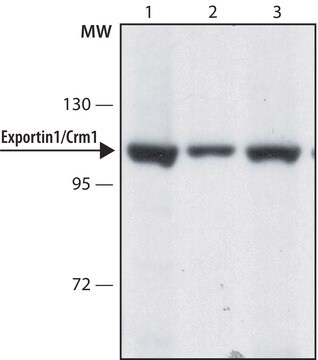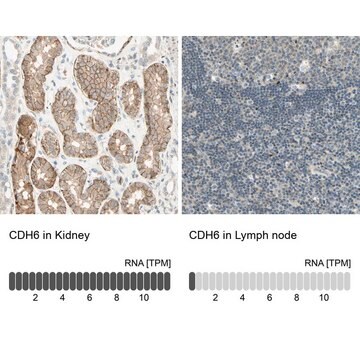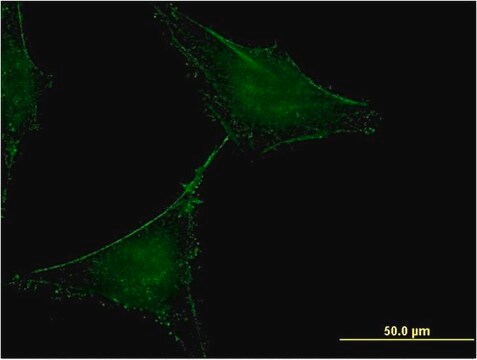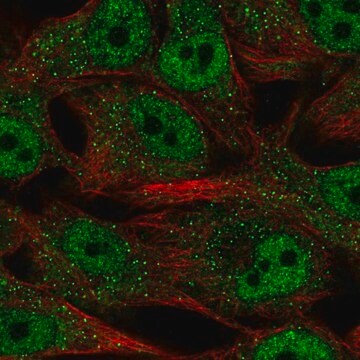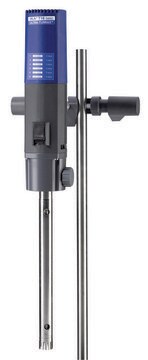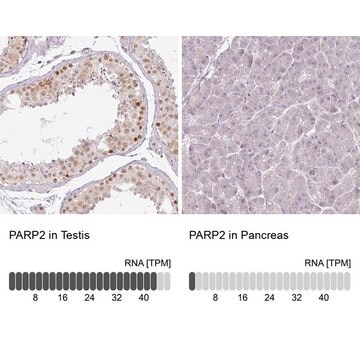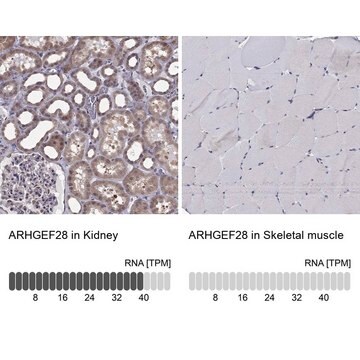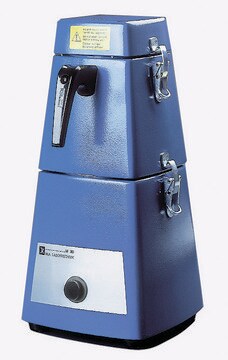推荐产品
生物源
rabbit
品質等級
共軛
unconjugated
抗體表格
affinity isolated antibody
抗體產品種類
primary antibodies
無性繁殖
polyclonal
產品線
Prestige Antibodies® Powered by Atlas Antibodies
形狀
buffered aqueous glycerol solution
物種活性
human
加強驗證
orthogonal RNAseq
Learn more about Antibody Enhanced Validation
技術
immunoblotting: 0.04-0.4 μg/mL
immunohistochemistry: 1:200-1:500
免疫原序列
ERQEEYIEEKKRVDICRETPNICPHSGENTEYDTIPHTNRTILKEDPANTVYSTVEIPKKMENPHSLLTMP
UniProt登錄號
運輸包裝
wet ice
儲存溫度
−20°C
目標翻譯後修改
unmodified
基因資訊
human ... SLAMF7(57823)
一般說明
Signaling lymphocytic activation molecule F7 (SLAMF7) protein is a member of the SLAM family and is expressed on macrophages, natural killer (NK) cells, monocytes, dendritic cells, and pro-B cells. The SLAMF7 gene is located on the human chromosome at 1q23.3.
免疫原
SLAM family member 7
應用
All Prestige Antibodies Powered by Atlas Antibodies are developed and validated by the Human Protein Atlas (HPA) project and as a result, are supported by the most extensive characterization in the industry.
The Human Protein Atlas project can be subdivided into three efforts: Human Tissue Atlas, Cancer Atlas, and Human Cell Atlas. The antibodies that have been generated in support of the Tissue and Cancer Atlas projects have been tested by immunohistochemistry against hundreds of normal and disease tissues and through the recent efforts of the Human Cell Atlas project, many have been characterized by immunofluorescence to map the human proteome not only at the tissue level but now at the subcellular level. These images and the collection of this vast data set can be viewed on the Human Protein Atlas (HPA) site by clicking on the Image Gallery link. We also provide Prestige Antibodies® protocols and other useful information.
The Human Protein Atlas project can be subdivided into three efforts: Human Tissue Atlas, Cancer Atlas, and Human Cell Atlas. The antibodies that have been generated in support of the Tissue and Cancer Atlas projects have been tested by immunohistochemistry against hundreds of normal and disease tissues and through the recent efforts of the Human Cell Atlas project, many have been characterized by immunofluorescence to map the human proteome not only at the tissue level but now at the subcellular level. These images and the collection of this vast data set can be viewed on the Human Protein Atlas (HPA) site by clicking on the Image Gallery link. We also provide Prestige Antibodies® protocols and other useful information.
Anti-SLAMF7 antibody produced in rabbit has been used in:
- immunofluorescence staining
- immunohistochemistry(1:1000)
- semi-quantitative immunohistochemistry(1:200)
生化/生理作用
Signaling lymphocytic activation molecule F7 (SLAMF7) protein acts as a positive regulator of natural killer (NK) cell activation by binding to Ewing′s sarcoma-associated transcript 2 (EAT-2). It functions as a biomarker of normal and malignant plasma cells in plasma cell myeloma. SLAMF7 is present in multiple myeloma cells and tumor cell targets.
特點和優勢
Prestige Antibodies® are highly characterized and extensively validated antibodies with the added benefit of all available characterization data for each target being accessible via the Human Protein Atlas portal linked just below the product name at the top of this page. The uniqueness and low cross-reactivity of the Prestige Antibodies® to other proteins are due to a thorough selection of antigen regions, affinity purification, and stringent selection. Prestige antigen controls are available for every corresponding Prestige Antibody and can be found in the linkage section.
Every Prestige Antibody is tested in the following ways:
Every Prestige Antibody is tested in the following ways:
- IHC tissue array of 44 normal human tissues and 20 of the most common cancer type tissues.
- Protein array of 364 human recombinant protein fragments.
聯結
Corresponding Antigen APREST87737
外觀
Solution in phosphate buffered saline, pH 7.2, containing 40% glycerol and 0.02% sodium azide.
法律資訊
Prestige Antibodies is a registered trademark of Merck KGaA, Darmstadt, Germany
免責聲明
Unless otherwise stated in our catalog or other company documentation accompanying the product(s), our products are intended for research use only and are not to be used for any other purpose, which includes but is not limited to, unauthorized commercial uses, in vitro diagnostic uses, ex vivo or in vivo therapeutic uses or any type of consumption or application to humans or animals.
未找到合适的产品?
试试我们的产品选型工具.
儲存類別代碼
10 - Combustible liquids
水污染物質分類(WGK)
WGK 1
閃點(°F)
Not applicable
閃點(°C)
Not applicable
CD4+ and CD8+ cytotoxic T lymphocytes may induce mesenchymal cell apoptosis in IgG4-related disease.
Cory A Perugino et al.
The Journal of allergy and clinical immunology, 147(1), 368-382 (2020-06-03)
IgG4-related disease (IgG4-RD) is an immune-mediated fibrotic disorder that has been linked to CD4+ cytotoxic T lymphocytes (CD4+CTLs). The effector phenotype of CD4+CTLs and the relevance of both CD8+ cytotoxic T lymphocytes (CD8+CTLs) and apoptotic cell death remain undefined in
Takashi Maehara et al.
The Journal of clinical investigation, 130(5), 2451-2464 (2020-01-29)
Systemic sclerosis (SSc) is an autoimmune fibrotic disease whose pathogenesis is poorly understood and lacks effective therapies. We undertook quantitative analyses of T cell infiltrates in the skin of 35 untreated patients with early diffuse SSc and here show that
Naoki Kaneko et al.
Clinical immunology (Orlando, Fla.), 237, 108991-108991 (2022-04-02)
Many studies have been performed in severe COVID-19 on immune cells in the circulation and on cells obtained by bronchoalveolar lavage. Most studies have tended to provide relative information rather than a quantitative view, and it is a combination of
Naoki Kaneko et al.
medRxiv : the preprint server for health sciences (2021-04-02)
The contributions of T cells infiltrating the lungs to SARS-CoV-2 clearance and disease progression are poorly understood. Although studies of CD8+ T cells in bronchoalveolar lavage and blood have suggested that these cells are exhausted in severe COVID-19, CD4+ T
Diederik J Höppener et al.
British journal of cancer, 123(2), 196-206 (2020-05-19)
Patients with resected colorectal liver metastasis (CRLM) who display only the desmoplastic histopathological growth pattern (dHGP) exhibit superior survival compared to patients with any non-desmoplastic growth (non-dHGP). The aim of this study was to compare the tumour microenvironment between dHGP
我们的科学家团队拥有各种研究领域经验,包括生命科学、材料科学、化学合成、色谱、分析及许多其他领域.
联系技术服务部门
